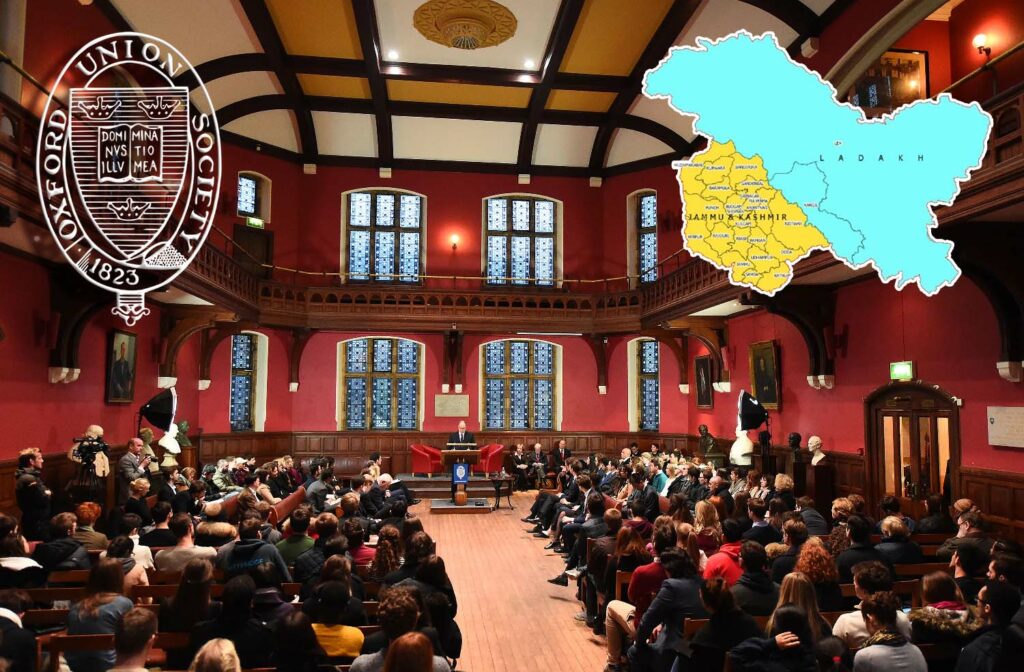
- British Hindus, more particularly the Kashmiri Pandit community, have emerged as fiercest critics of this debate.
- Senior journalist Aditya Raj Kaul and filmmaker Vivek Agnihotri have pulled out from speaking at the event, citing grave reservations over sharing the same platform with those with terrorist connections.
- Academic institutions retain all rights to debating topics, but they must be aware that hosting people associated with terrorism and separatism will tarnish their reputation and purpose
The Oxford Union’s decision to debate “This House Believes in the Independent State of Kashmir” has stirred up a storm of protest, especially in diaspora communities of British Hindus and Indians. The November 14 discourse has been placed under sharp focus because of speakers who have reportedly had terrorism ties, including Muzammil Ayub Thakur and Zafar Khan. Alarming concerns have been raised due to the affiliations of these individuals with terrorism and separatist movements that are well-known violators in Kashmir. His association with the World Kashmir Freedom Movement, accused of being funded by Pakistan’s ISI and charged with terrorist activities, is rather alarming. His father Ayyub Thakur’s association with terror funding in Jammu and Kashmir also casts a dark shadow over his invitation to this premier institution.
There is an intersection of discourses with India’s core sovereignty, as its constitution, parliament and international treaties irrevocably establish the integration of Kashmir within India. The revoke of Article 370 in 2019 brought a momentous clarity to India’s stand on the question of Kashmir’s status finally finding closure regarding questions of sovereignty. A far more glaring infringement of India’s territorial integrity is seen in the Oxford Union’s willingness to entertain any discussion on Kashmir’s right to independence with individuals closely associated with separatism and militancy being given a revered platform.
Of late, British Hindus, more particularly the Kashmiri Pandit community, have emerged as fiercest critics of this debate. At the beginning of the 1990s, Islamists committed a brutal exodus of the Kashmiri Pandits, where they subjected the community to systematic persecution and ethnic cleansing. The community still bears the imprint of that displacement trauma and does not for a moment see reason in such a debate that has dismissed its suffering as insignificant. In a statement to Business Standard, the organizations say, “British Hindu rights should not be taken for granted by the British government if speakers like Thakur are invited to parade on campus. Thus, this is an insult to previous victims and can only serve to provoke separatist ideologies.
When some of India’s most prominent personalities declined to participate, the protests started heating up. Aditya Raj Kaul, a senior journalist and a Kashmiri Pandit himself, pulled out from speaking at the event, citing grave reservations over sharing the same platform with Thakur, whose alleged terrorist connections he cannot brush off. For example, celebrated filmmaker Vivek Agnihotri, who made “The Kashmir Files,” declined the invitation, suggesting it was “fundamentally offensive, anti-India, and anti-Kashmir.” Agnihotri, who is not a shy critic of international narratives on Kashmir, termed it absurd that someone is questioning India’s sovereignty over the matter that has been conclusively dealt with by the abrogation of Article 370.
The contentious nature of the framing of this debate and its speakers therefore raises deep questions about the role of prestigious institutions such as the Oxford Union, in airing discussions that challenge existing sovereign boundaries. Therefore, though academic discourse and democratic debate must be sacred, a critical distinction does exist between fostering constructive dialogue and legitimising persons associated with extremism. In that sense, such debates might validate separatist movements and potentially destabilize regions.
This demands the Indian diplomatic machinery to strive for a perfect blend of democratic values and sovereign interests. All the while ensuring that democratic ideals and free speech are preserved, India has a compelling need to shield its territorial integrity from foreign influences where speakers alleged terror-related elements used it as a platform that was weakening the unity of the country. A strategic move can be trying to convince the British authorities and other international forces to convince speakers suspected of being linked with terrorism. The Indian side can also rebut the dominant narratives by sharing accurate information about the legal accession of Kashmir and the peace process initiated long ago.
If the Indian diaspora in the UK mounts organized opposition to events that might compromise India’s sovereignty, it can exercise considerable influence. Efforts by INSIGHT UK for instance to draw attention to the consequences of the debate and dangers of giving platforms to extremist opinions under the guise of academic intellectual freedom reflect proper community engagement. The diaspora can ensure that such debates are given due scrutiny through coordinated peaceful demonstrations, media advocacy, and political outreach.
In conclusion, the Oxford Union’s Kashmir independence debate has stirred strong protests from the British Hindus and Indian community. This is because the inclusion of speakers having terrorism links has transformed the meeting into a rallying point for controversy. Academic institutions retain all rights to debating topics, but they must be aware that hosting people associated with terrorism and separatism will tarnish their reputation and purpose. India and its friends will need to do this in a manner that protects academic forums from being conduits for a destabilizing agenda.
Saisha is pursuing a Bachelor of Diplomacy and Foreign Policy at the JISA, O.P. Jindal Global University. Her areas of interest include economics, business, diaspora studies, and diplomacy. Views expressed are the author’s own.
